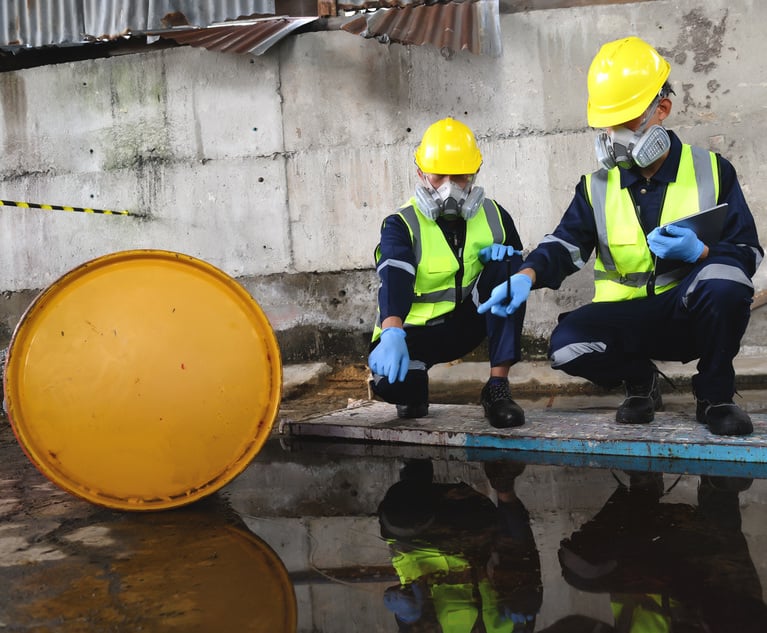NJ Environmental Law's Top 10 of 2022
Environmental law and policy in New Jersey have seldom remained in a static condition. Rather, they have continued to evolve due to judicial, executive, and legislative decisions. The most significant of those developments in 2022 are reviewed in this article.
November 30, 2022 at 11:00 AM
9 minute read
 Environmental law and policy in New Jersey have seldom remained in a static condition. Rather, they have continued to evolve due to judicial, executive, and legislative decisions. The most significant of those developments in 2022 are reviewed in this article.
Environmental law and policy in New Jersey have seldom remained in a static condition. Rather, they have continued to evolve due to judicial, executive, and legislative decisions. The most significant of those developments in 2022 are reviewed in this article.
10. Access Statute Clarified
The 1993 Brownfield and Contaminated Site Remediation Act recognized the possibility that some landowners would be unwilling to consent to having their property accessed for environmental investigations. If good-faith efforts were unsuccessful, the remediating party could apply to the Superior Court for an order "directing the property owner to grant reasonable access to the property." N.J.S.A. 58:10B-16(a)(1).
Applying for involuntary access and having it granted are not the same thing as the plaintiff in Solvay Specialty Polymers USA v. Paulsboro Refining Co., was to learn. 2022 WL 4392064 (App. Div. 2022). Access was denied due to its failure to satisfy the statutory grounds for relief: N.J.S.A. 58:10B-16(b)(1) (proof of a reasonable possibility that contamination from an offsite source had migrated onto the owner's property), or (b)(2) (proof that access to the offsite property was reasonable and necessary for remediation). The takeaway is that those seeking involuntary access need to satisfy the statutory requirements. For additional discussion of this decision, see L. Goldshore, "Limits to Accessing Property for Remediation," 228 N.J.L.J. 2890 (Nov. 7, 2022).
This content has been archived. It is available through our partners, LexisNexis® and Bloomberg Law.
To view this content, please continue to their sites.
Not a Lexis Subscriber?
Subscribe Now
Not a Bloomberg Law Subscriber?
Subscribe Now
NOT FOR REPRINT
© 2025 ALM Global, LLC, All Rights Reserved. Request academic re-use from www.copyright.com. All other uses, submit a request to [email protected]. For more information visit Asset & Logo Licensing.
You Might Like
View All
The End of Innocence? DEP’s End Run Around ‘All Appropriate Inquiry’ Spill Act Protections
10 minute read
Neighboring States Have Either Passed or Proposed Climate Superfund Laws—Is Pennsylvania Next?
7 minute read
NJ Manufacturing Company Sues Insurer to Recoup PFAS Remediation Losses
4 minute read
Law Firms Mentioned
Trending Stories
- 1Eliminating Judicial Exceptions: The Promise of the Patent Eligibility Restoration Act
- 2AI in Legal: Disruptive Potential and Practical Realities
- 3One Court’s Opinion on Successfully Bankruptcy Proofing a Borrower
- 4Making the Case for Workflow Automation
- 5Copyright Infringement by Generative AI Tools Under US and UK Law: Common Threads and Contrasting Approaches
Who Got The Work
J. Brugh Lower of Gibbons has entered an appearance for industrial equipment supplier Devco Corporation in a pending trademark infringement lawsuit. The suit, accusing the defendant of selling knock-off Graco products, was filed Dec. 18 in New Jersey District Court by Rivkin Radler on behalf of Graco Inc. and Graco Minnesota. The case, assigned to U.S. District Judge Zahid N. Quraishi, is 3:24-cv-11294, Graco Inc. et al v. Devco Corporation.
Who Got The Work
Rebecca Maller-Stein and Kent A. Yalowitz of Arnold & Porter Kaye Scholer have entered their appearances for Hanaco Venture Capital and its executives, Lior Prosor and David Frankel, in a pending securities lawsuit. The action, filed on Dec. 24 in New York Southern District Court by Zell, Aron & Co. on behalf of Goldeneye Advisors, accuses the defendants of negligently and fraudulently managing the plaintiff's $1 million investment. The case, assigned to U.S. District Judge Vernon S. Broderick, is 1:24-cv-09918, Goldeneye Advisors, LLC v. Hanaco Venture Capital, Ltd. et al.
Who Got The Work
Attorneys from A&O Shearman has stepped in as defense counsel for Toronto-Dominion Bank and other defendants in a pending securities class action. The suit, filed Dec. 11 in New York Southern District Court by Bleichmar Fonti & Auld, accuses the defendants of concealing the bank's 'pervasive' deficiencies in regards to its compliance with the Bank Secrecy Act and the quality of its anti-money laundering controls. The case, assigned to U.S. District Judge Arun Subramanian, is 1:24-cv-09445, Gonzalez v. The Toronto-Dominion Bank et al.
Who Got The Work
Crown Castle International, a Pennsylvania company providing shared communications infrastructure, has turned to Luke D. Wolf of Gordon Rees Scully Mansukhani to fend off a pending breach-of-contract lawsuit. The court action, filed Nov. 25 in Michigan Eastern District Court by Hooper Hathaway PC on behalf of The Town Residences LLC, accuses Crown Castle of failing to transfer approximately $30,000 in utility payments from T-Mobile in breach of a roof-top lease and assignment agreement. The case, assigned to U.S. District Judge Susan K. Declercq, is 2:24-cv-13131, The Town Residences LLC v. T-Mobile US, Inc. et al.
Who Got The Work
Wilfred P. Coronato and Daniel M. Schwartz of McCarter & English have stepped in as defense counsel to Electrolux Home Products Inc. in a pending product liability lawsuit. The court action, filed Nov. 26 in New York Eastern District Court by Poulos Lopiccolo PC and Nagel Rice LLP on behalf of David Stern, alleges that the defendant's refrigerators’ drawers and shelving repeatedly break and fall apart within months after purchase. The case, assigned to U.S. District Judge Joan M. Azrack, is 2:24-cv-08204, Stern v. Electrolux Home Products, Inc.
Featured Firms
Law Offices of Gary Martin Hays & Associates, P.C.
(470) 294-1674
Law Offices of Mark E. Salomone
(857) 444-6468
Smith & Hassler
(713) 739-1250






